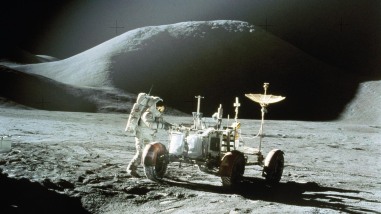“We choose to go to the moon in this decade and do the other things, not because they are easy, but because they are hard.”
Those words have echoed through the minds of Americans ever since John F. Kennedy said them in 1962. It would take another seven years after this speech for the United States to land on the moon. Over those years, the ones preceding them, and the decades to follow, men and women sacrificed everything they had to reach and study the moon. Al Reinert‘s For All Mankind is dedicated to these people, honoring their life’s work. Reinert began interviewing astronauts in 1976, conceptualized this documentary in 1979, and then spent the next decade with editor Susan Korda sifting through footage NASA had shot. It was a massive effort, one that puts the audience into the control room, the spaceship, and the astronauts’ minds as they go where no one had ever been before.

Of all the words and phrases spoken in For All Mankind, the one that sticks out the most is “vastness”. Many astronauts touched on the feeling, describing their awe in seeing the vastness of our universe. This is applied in many ways, whether in the expected overwhelming sensation of seeing the entire universe laid before them or even when looking at our own, relatively small, planet. Breathtaking shots of the spaceship flying over Africa with little dots of campfires seen from high in the sky or the palpable feeling of the world’s eyes being on these astronauts, make our world feel as vast as space. For All Mankind is a story of the men and women who worked to get to the moon, but it is also a story of humanity. It is a story of the wonder that can be accomplished when we work together.
The awe that the astronauts speak of is perhaps the most powerful element of For All Mankind. They speak of the eyes of the world being upon them and of the isolation one feels on the lunar surface, equating it to that of Adam and Eve. As their eyes and the camera scan the surface or the blackness around them, the gravity of the situation is unmistakable. It is, as is stated in the film, “precarious yet comfortable.” This footage provides the same feeling for the audience. Seeing the astronauts hop around the moon feels undeniably surreal, while seeing the sun, Earth, and moon from such a unique vantage point is a sight like no other. No matter how many times one has seen some of this footage – and For All Mankind does offer a wealth of never before seen footage – it is impossible to overcome this sense of awe. Bringing together these images as a single 80-minute experience serves as a summation of the Apollo program and all it entails, but it feels like so much more. It gifts these experiences to the viewer, coming as close as it can to allowing “all mankind” to walk with these astronauts.
The wonder that the astronauts and scientists feel as they see their dreams come to fruition are matched by the audience’s shared feelings towards their work. As things go wrong on a ship, the calm with which they handle the situation and approach fixing it is stunning. The grace with which the ship lands on the moon, or the close-ups of the smoke and flames arising from the ship as it takes off leave the audience floored with the scope of what has been accomplished. This was a mission, as John F. Kennedy promised, undertaken to advance human knowledge. Al Reinert’s For All Mankind is a celebration of both the Apollo program and those who dared to imagine it possible, representing every thought, feeling, and bead of sweat that went into turning these dreams into reality.


0 comments on “The Vast Universe and For All Mankind”